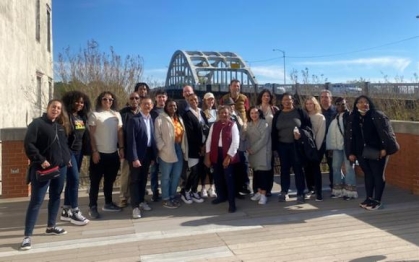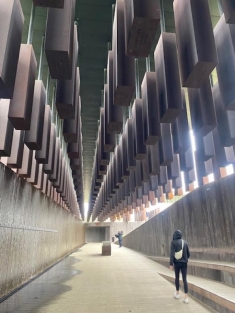Spring Break Travel Diaries: The American South

Travel courses offered at Rutgers Law this semester culminated in immersive, educational trips during Spring Break. One course, "Law and Instruments for Social Change," inspired students with the transformation of the American South and beyond during the Civil Rights Movement and prompted them to identify links to past and current social justice problems between the south and New Jersey.
It can be easy to get frustrated with the slow-moving gears of social justice. In fact, says University Professor of Law David Lopez, it’s not uncommon for law students to find themselves overwhelmed by the prospect of enacting meaningful change. But a new travel course offered in Newark called "Law and Instruments for Social Change" was designed to inject some inspiration. In the classroom, students explored the end of Reconstruction and the rise of Jim Crow before embarking on a tour of iconic locations throughout the American South and the Civil Rights Movement.
“The trip focused on this amazing, disruptive moment in history,” says Lopez, Professor Alfred Slocum Scholar and Co-Dean Emeritus. “We really focused on the sacrifices and achievements of ordinary people from around the country. I wanted our students to connect the through lines from this freedom struggle to contemporary inequities in our own backyard.”
The group started their journey in Birmingham, Alabama, where infamous images of German Shepherds attacking nonviolent protestors rallied people nationwide to take up political action, ultimately resulting in the March on Washington and the Civil Rights Act of 1964. From there, the group traveled to Montgomery, where they visited the National Memorial for Peace and Justice and the Legacy Museum, which shines a spotlight on the connections between slavery and mass incarceration. They met with civil rights veterans and judges in Selma, Jackson, Memphis, and along the Mississippi Delta, where they visited Parchman Farm, one of the nation’s most notorious prisons known for perpetuating “slavery by another name.”
Additional faculty and alumni traveled with students on the tour including Professor Alexis Karteron, Assistant Professor and southern native Marjorie Crawford, Lecturer Yael Bromberg '11, civil rights advocate and journalist King Downing '92, and shareholder at Wolf Greenfield Jeffrey Hsi '97.

According to Lopez, the trip was designed to remind participants of the nation’s potential for transformation thanks to the work of everyday people. “It’s important for law students to understand that within this country, and globally, there are opportunities to produce change,” he says. “The question is: How do you function as a lawyer, advocate, and negotiator within a movement like this, while also running into issues of race, gender, and class? How can you work through these challenges to define and achieve your goals?”
Navigating these questions was “nothing short of life-changing” for second-year law student Kirsten Mason-Jones, who found herself inspired with a renewed commitment to social justice after returning home. “This class and trip have increased the level of accountability I place on myself,” she says. “The need to personify ‘The People’s Law School’ and impact the lives of marginalized people near and far means more now than ever. I walk away better for having this experience, I walk away responsible for having been a witness to history in this way, and I walk away motivated to make my own impact in the area of civil rights and social justice."